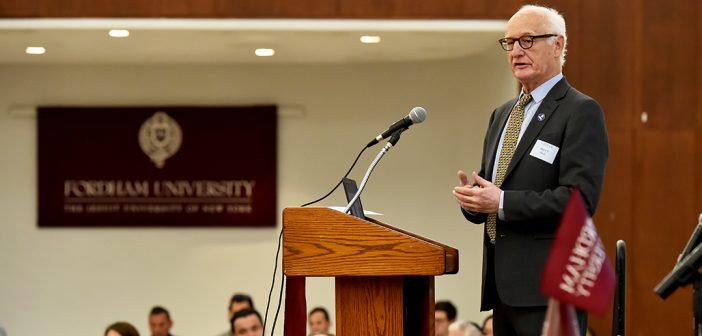PCS Dean Anthony Davidson, Ph.D., said the conference was designed to lay out harsh realities and find solutions.
“Sports stands as the great unifier, it completely breaks the ice and creates opportunities to bond,” said Davidson.
Speakers came from a variety of sports backgrounds, including American football, rowing, horse racing, fencing, and soccer. They also came from a variety of ethnic backgrounds and spoke on all forms of prejudice.
“By focusing on issues surrounding anti-Semitism, we can talk about all forms of racism,” he said. “We also want to understand how we use sports to move the needle, but in order to do that we need to know where the needle is.”
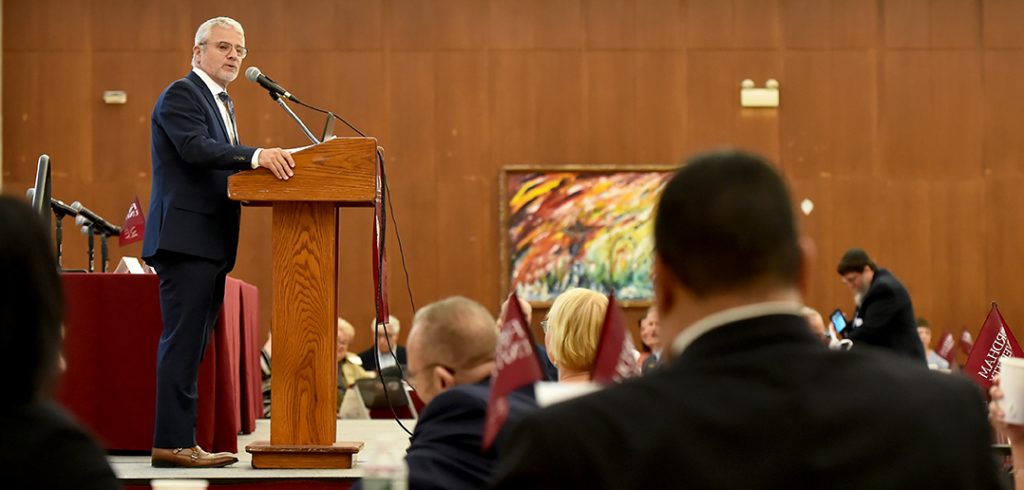
Dean Davidson opens the conference.
Sports and Society
From the start, speakers reflected on how sports mirrors society at large and how star players, with their outsized power of image, can help curb prejudice simply by speaking out.
In prepared remarks delivered by Davidson, Joseph M. McShane, S.J., president of Fordham, referred to the event as a “landmark summit.”
“I do not have to tell any of you here that the playing field has for some time been a battleground against ugly anti-Semitic and racist language and behavior,” McShane said, noting in his remarks that he regretted that he couldn’t be there in person. “I want to say to you unequivocally and bluntly that anti-Semitism is not a Jewish problem—it is a sin, a mortal sin, against the Jewish people and a crime against the human family.”
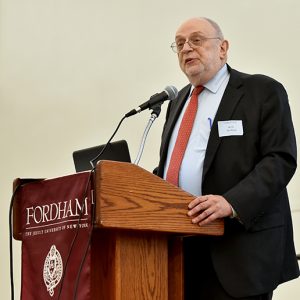
Ken Jacobson
In an opening keynote address, Kenneth Jacobson, deputy national director at the Anti-Defamation League, agreed with Father McShane. He noted a growing “loss of shame” about anti-Semitism reflected both on and off the playing fields in America and Europe.
Jacobson said that off the field, both sides of the political spectrum foster prejudice. He said it can come from the right, the left, majority communities, and minority communities. As an example, he labeled the United Kingdom’s Labor Party as “institutionally anti-Semitic.” In France, he said, there has been an internal migration away from certain areas of the country that has led to a “re-ghettoization of Jews.”
“The denial of the left is, ‘It can’t possibly come from us,’” he said. “That allows denial and nuance to enter the mainstream. “We see it with members of Congress. The worry is that this kind of ‘soft anti-Semitism,’ if you will, now becomes much more mainstream.”
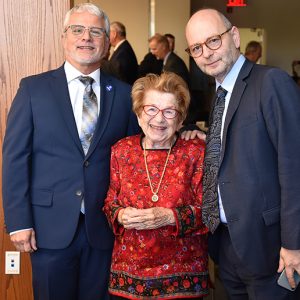
Davidson, Dr. Ruth Westheimer, and Stephen Smith, executive director USC Shoah Foundation and UNESCO Chair on Genocide Education
He noted that Jewish students in Europe often go to school under far tighter security than is necessary in the U.S., due in part to long-standing prejudices and contemporary radicalization of Islamic fundamentalists.
“The fact that it’s happened in Europe shouldn’t be shocking considering the long history [of anti-Semitism]; in America it is shocking,” Jacobson said. “There were so many instances at ADL where people in the Jewish community ask us, ‘What are you bothering with anti-Semitism in America it’s no longer a problem, we have a comfortable life, we’re treated as equals?’ and we said, ‘Don’t be complacent about it.’”
He said this new burst of anti-Semitism coming from different sources has pushed security issues in the U.S. to come to the fore, particularly after the violence in places like Charlottesville, Pittsburgh, and even in Brooklyn, where he said Hassidic Jews are attacked “almost every day.”
When Digital Hate Spills onto the Playing Field
The way hate speech enters the mainstream—and by extension the sports arena—is primarily via the internet, said several panelists over the course of the day.
Panelist Oren Segal, director of the Anti-Defamation League’s Center on Extremism, tracks and monitors hate speech for the group. He sat on a panel titled “The Impact of Hate on Society.”
“Nothing is more in the service of casual hate speech than this phone right here,” he said, holding up a cell phone.
Segal used the example of 13, 14 and 15-year-olds who think it’s ironic or humorous to make a joke of murderous behavior, sometimes defacing websites set up to memorialize victims of neo-Nazi violence. He noted that even though such behavior is gravely problematic, if examined, solutions can begin to be addressed.
“We should be looking at incidents and how the community responds,” he said. “The sense of community provided through sports, that could be a great remedy.”
How Fandom Becomes Hate
On a panel titled “The Realities: Anti-Semitism and Sports,” Andrei Markovits, Ph.D., the Arthur F. Thurnau Professor and Karl W. Deutsch Collegiate Professor of Comparative Politics and German Studies at the University of Michigan, said that the majority of sports fans are not troublesome, though the tribal aspects of sports culture can be fertile ground for repressed prejudices.
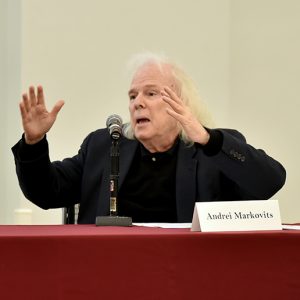
Andrei Markovits, Ph.D.
“Affinities to sports teams connote an identity, that means they become tribal by being an identity,” he said. “In Europe, these identities are not only a sports team—these sports teams evolved out of the club system, which was part of a church, part of a party, part of a neighborhood.” That makes them even more tied to identity, he said.
He divides sports fanatics into five circles of fandom: awareness, affection, allegiance, attachment, and a fifth he calls affliction/addiction. It’s in the affliction/addiction category that the bigot can come to the fore.
“Sports fandom creates a tribalism that permits a language that otherwise would not be used,” he said, adding that within the affliction/addiction category it can manifest as extreme prejudice.
Hate at Yankee Stadium
As panelist Christian Araos, a freelance journalist covering professional soccer, has reported, the stadium can also become a forum for neo-Nazis. He has written about skinhead groups that have infiltrated the fanbase of New York City Football Club (NYCFC) matches at Yankee Stadium.
“They immediately alarmed their other fans though their chanting and symbolism,” he said, noting that “everyone tried to downplay it and tried to not think about it. What we need is leadership to eradicate it or it’s going to linger there; you need to cleanse it somehow.
Tibi Galis, executive director at the Auschwitz Institute for Peace and Reconciliation, warned that mass atrocities begin with very simple things, like hate speech at sporting matches.
“Sports is often one of the very first spaces we hear the manifestation of dangerous speech,” he said. “The question is, ‘How we can make the sports environment the better one?’”
Araos reported that NYCFC management has a zero-tolerance policy toward racists and a tweet in his article suggested NYCFC security has responded to quell violence before it starts. He said that he’s become optimistic because a majority of fans have mobilized against the threat.
“It just goes to show there are ways for fanbases to fight back and do so in ways that are nonviolent and nonconfrontational to educate society,” he said. “I’m optimistic these are ways we can build a better future.”
Solving the Problem in the Arena
In London, the Chelsea Football Club has a highly sophisticated way of dealing with racists. Panelist Rola Brentlin, head of special projects at Chelsea FC, leads the club’s efforts to combat anti-Semitism. She said that a combination of factors helps management hone in on troublemakers. First, identification is required to purchase tickets. Second, fans concerned with bad behavior can text management at the first signs of trouble. Third, closed-circuit TV monitors the entire stadium, section by section.
Between panel sessions, Bruce Buck, chairman of Chelsea FC, said that the club has hired people to focus specifically on anti-Semitism. He said the effort goes beyond influencing Chelsea fans. The hope is that other clubs may join in the effort, which was spearheaded by the club’s ownership.
“Our owner, Roman Abramovich, noticed that no one in the sports club area was focusing on anti-Semitism, and he said, ‘Don’t take away from all the other things we’re doing about discrimination, let’s add to that with this special project,” said Buck, referring to a campaign the club announced last year to raise awareness and educate players, staff, and fans about anti-Semitism in football. With a range of partners that include the World Jewish Congress and London’s Jewish Museum, the club goes so far as to have their foundation facilitate equality and diversity workshops in primary schools.
“There’s definitely been a rise [in anti-Semitism]; I personally believe a lot of it is due to the anonymity that social media provides, and I think that’s been a sea change,” Buck said. “Unless we can do something about that, we’ve got a real problem. That’s why we decided to make it a special project.”
He said the club does ban fans, but does not want to ban people for years at a time. If a banned fan takes advantage of an educational opportunity with the club’s diversity officers, they will be let back in.
“The theory being that if we just banned them for life, we’re not going to change their ways. They’re going to be even more anti-Semitic,” he said. “So, the thought is, education, education, education. It can change behavior.”
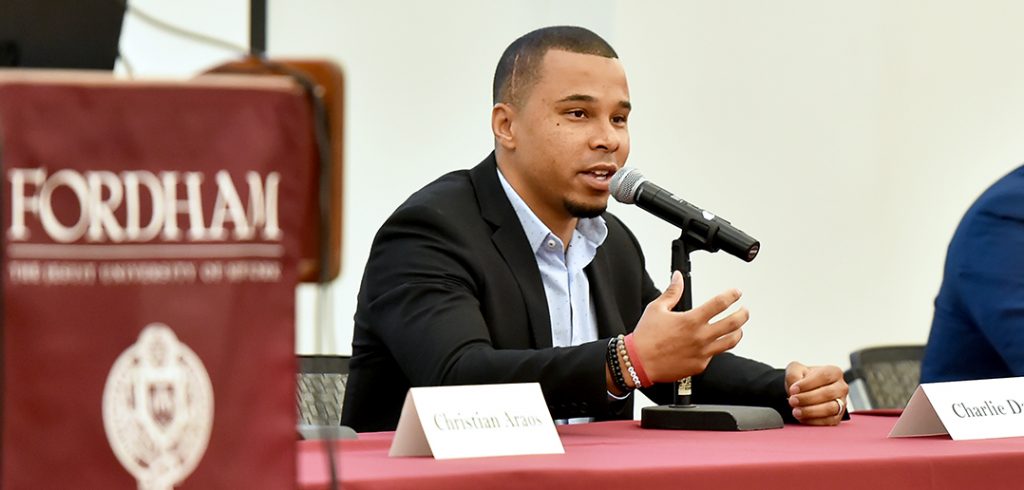
Charlie Davies, club ambassador for conference co-sponsor New England Revolution, described a visit to Auschwitz sponsored through a partnership with Chelsea FC that “touched to the core.” “It moved me to come back and help spread the word as a professional athlete and use the influence we have in our community to educate,” he said.
